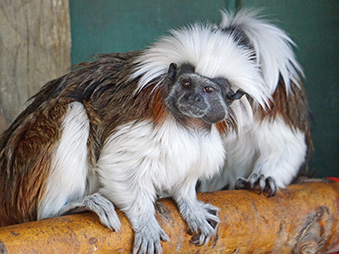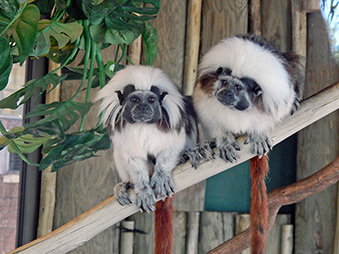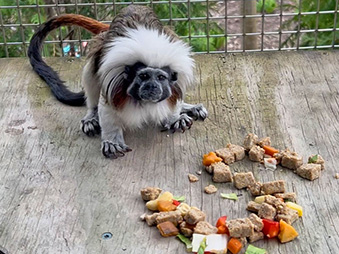Saguinus oedipus | Cotton-Top Tamarin
Names:
- Male: Ramon
- Female: Pax



Meet Ramon and Pax, Our Cotton-Top Tamarins
What’s small, full of energy, and rocking an unforgettable hairstyle? Meet Ramon and Pax, our cotton-top tamarins! These tiny primates are hard to miss with their fluffy white crests and expressive faces.
Native to the tropical rainforests of northwest Colombia, cotton-top tamarins are expert climbers, using their sharp claws and long tails to navigate the treetops. They’re highly social animals that communicate with at least 38 different vocalizations, some so high-pitched that humans can’t even hear them!
A Tiny, Agile Package
Cotton-top tamarins are small in size but big in energy. As adults, they weigh between 9-13 oz and measure about 7-9 inches long, with their tails stretching to about 10 inches. Though their tails are not prehensile (meaning they can't grasp things like a hand), they are incredibly important for balance as these tamarins zip through the trees.
Another interesting feature is their modified claws on all fingers and toes, which are perfect for climbing and defense. Their diet consists of insects, fruit, small animals, and exudates like gum, nectar, and sap.
Family Dynamics & Reproduction
Cotton-top tamarins are monogamous, meaning they mate for life. They live in family groups, which can range from 3 to 9 members, with a dominant breeding pair at the center. In these troops, other adults, called helpers, play a crucial role in raising the young. This cooperative breeding strategy increases their chances of survival and reproductive success.
Young tamarins cling to their parents for the first few months and learn essential survival skills from the rest of the troop. In the wild, cotton-top tamarins usually give birth to non-identical twins, though triplets have been recorded. The breeding season runs from January to June, with females reaching sexual maturity at 18 months and males at 24 months.
Fact Sheet
Taxonomy
Genus: Saguinus | Species: oedipus |
Kingdom: Animalia | Phylum: Chordata | Class: Mammalia | Order: Primates | Family: Callitrichidae |
Favorite Enrichment Type
Opportunities to forage for bugs!
Life Span
- In the Wild: Average of 13.5 years
- In Human Care: Up to 26 years
Diet
- In the Wild: Small fish, like sardines and anchovies.
- At the Zoo: Zupreem Marmoset diet (a canned food for primates), fruit, vegetables, insects, nuts and seeds.
Geographic Range
Restricted to a small area of northwest Colombia, between the Cauca and Magdalena Rivers to the south and east, the Atlantic coast to the north, and the Atrato River to the west.
Habitat
Tropical rainforests, open woodlands, and secondary growth forests.
Status: Critically Endangered
Breeding & Conservation
Sadly, the future of cotton-top tamarins in the wild is at risk. They are classified as Critically Endangered due to habitat destruction, the illegal pet trade, and deforestation in Colombia. The rapid clearing of forests for agriculture and development has left their habitats fragmented.
However, efforts are being made to save these remarkable primates. Proyecto Tití, an organization dedicated to cotton-top tamarin conservation, works to restore their natural habitat, educate local communities, and provide sustainable economic alternatives to deforestation. One of their innovative programs is the Fence Program, which helps farmers replace barbed wire with living fences made from native trees. These sustainable fences not only reduce deforestation but also provide new habitats for tamarins and other wildlife.
What We’re Doing to Help
The Saginaw Children’s Zoo is proud to participate in several efforts to protect this incredible species:
- Species Survival Plan (SSP) – Ensures healthy, genetically diverse cotton-top tamarin populations in human care
- Support for Proyecto Tití – A frontline organization in Colombia that restores forests, educates local communities, and provides sustainable economic alternatives to deforestation
Every cotton top tamarin born at our Zoo represents hope for the future—and we’re proud to be a part of that legacy.
How You Can Help
You can play a role in conserving cotton-top tamarins by making small changes in your daily life:
- Choose sustainably sourced products: Look for shade-grown coffee and FSC-certified wood to help protect rainforests.
- Reduce single-use plastics: Use reusable bags, bottles, and containers to cut down on plastic waste.
- Spread awareness: Educate others about the cotton-top tamarin and rainforest conservation.
Not a Pet: Why Primates Shouldn't Be Pets
Despite their small size and social nature, cotton-top tamarins do not make good pets. The illegal pet trade is one of the major threats to their survival. While they may seem like cute, manageable companions, tamarins require highly specialized care.
Here's why primates don’t belong in homes:
- Highly social: Tamarins live in family groups in the wild and need constant social interaction. Keeping one alone can cause extreme stress.
- Complex diet: Their diet is very specific and requires a balance of fruits, insects, proteins, and supplements.
- Long lifespan: With a lifespan of up to 26 years, tamarins are a long-term commitment.
- Specialized care: Tamarins need climbing space, enrichment, and specialized primate veterinary care, which most homes cannot provide.
- Behavioral issues: Primates kept as pets often develop aggression, anxiety, and self-destructive behaviors.
The best way to help tamarins is to leave them in the wild, where they belong, instead of supporting the pet trade. Support organizations that protect wildlife and work to provide sustainable livelihoods for local communities.
The Human Element: Why Conservation Must Support People, Too
When it comes to conservation, it’s crucial to understand the human impact. Often, animals like cotton-top tamarins are poached because local communities lack economic opportunities.
By supporting conservation organizations like Proyecto Tití, we can help people work alongside the environment instead of exploiting it. These organizations provide alternative income sources, such as creating eco-friendly products from recycled materials, helping communities earn a living without harming wildlife.
Want to Learn More?
Visit the Not-a-Pet Campaign to learn more about why primates should never be kept as pets and how you can help protect them. Every small change makes a difference in safeguarding the future of tamarins and countless other rainforest species!
How to Find Us
In the Rainforest Building along with Elton the Two-toed Sloth, and the Red-footed tortoises, down the path from the Contact Yard and across from the chicken coop area.
